Cyberpunk 2077 is a very different game today than the one that launched to howls of derision originally. Patch after patch has turned it into a great game that is easy to pick up and get absorbed into. If you are just starting out on your Cyberpunk journey then Gamer Guides pages will help you on your way. To start you off, here are some of our best go-to tips on how to get the best from your first experiences in the neon world… updated for patch 2.0, of course!
Cyberpunk 2077 Tips for Beginners¶
While many of the game’s mechanisms will be familiar, Cyberpunk 2077 foes have a few nuances that it helps to get to know a little more intimately. We have broken our following tips down into clearly marked sections so you can head to what you need the most quickly.
The Painkiller perk will allow you to regenerate health while in combat.
Cyberpunk 2077 Combat Tips¶
- Your health will fully regenerate… outside of combat. If you want to get some natural in-combat healing you’ll need to invest in the Painkiller perk (Body 4+), and if you want it to actually do something meaningful, you’ll probably want to scoop up Comeback Kid (Body 4+).
- Mods can dramatically alter how weapons perform in combat, with muzzles adding or bolstering effects like recoil reduction, ricochet chance, sights affecting aim zoom, maximum range and aim-down-sight time, and general mod slots boosting elemental damage, tech weapon functionality, bullet spread, and more. Depending on your playstyle, the most impact mods may be silencers, which can dramatically boost stealth damage and make it much harder for enemies to detect you when you fire… although the corpses of their comrades is a dead giveaway (pun intended).
Attacking will consume stamina - run out of stamina and your accuracy with ranged weapons will decrease, and your attack rate with melee weapons will be slowed down.
- Attacking with guns or melee weapons consumes stamina as of patch 2.0, although different weapon types may consume different amounts of stamina in different circumstances. In addition, jumping, dashing and sprinting in combat all consume stamina, too. Your accuracy will be reduced when your stamina is low, and you won’t be able to perform melee attacks without sufficient stamina, essentially slowing down your attack rate and preventing combos. Check out the Weapon Stamina System Explained page for more details.
(1 of 2) Mods can greatly alter how your weapon performs, especially silencers,
Mods can greatly alter how your weapon performs, especially silencers, (left), which will make it much easier to sneakily pick off enemies. (right)
-
Different weapons have different headshot damage multipliers. If you plan to snipe or use stealth, keep an eye on this stat, as it can drastically affect a weapon’s performance in that application.
-
Enemy AI is rarely up to the task of finding you when you’re hidden, which makes silenced weapons and stealth a good combination. Make sure your weapon of choice deals high single-shot damage and has a favorable headshot variable - if you can kill an enemy with a single headshot, you likely won’t be detected. Enemies may come looking for you after seeing the brain of their friend paint the walls, but you can usually just pick them off one at a time as they come to investigate. A silenced revolver is a very effective short-to-mid range stealth option.
(1 of 2) Quickhacking enemies will invariably lead to them tracing you.
Quickhacking enemies will invariably lead to them tracing you. (left), You can get around this by hitting enemies with Sonic Shock and Synapse Burnout together in a queue. (right)
-
It’s virtually impossible for an enemy to detect you while you’re performing stealth quickhacks, as all you need is line of sight on the target. That said, enemies will almost always start to trace your location if you perform a quickhack, even if they don’t have a dedicated netrunner in their midst. Gone are the days of using Contagion from stealth and just watching entire floors of enemies succumb. You can get around this by using Sonic Shock followed by Synapse Burnout - this combo should kill most targets and prevent them from communicating with their allies. Results depend on your perk and cyberware investments, of course.
-
If an enemy starts to trace your location, killing them will end their trace. That said, it’s not as easy to find an enemy tracing you as it is finding a nethacker trying to quickhack you, and it’s entirely possible that the tracer is nowhere near the enemy you quickhacked to provoke the tracing attempt! Prevention is the best option, in this case (see tip above), but failing that, getting far enough away can also disrupt the trace.
(1 of 2) To get the most out of quickhacking you’ll need to invest in the Intelligence perk tree,
To get the most out of quickhacking you’ll need to invest in the Intelligence perk tree, (left), where you’ll unlock many useful abilities, like queueing up multiple quickhacks at a time and Overclock mode. (right)
- You usually don’t need to invest many attribute or perk points to have some proficiency in a type of combat… save for netrunning. While your ability to use high-end cyberdecks and quickhacks isn’t gated by any attributes or perks, quickhacking doesn’t really come into its own unless you have the Hack Queue [Intelligence 9], Queue Acceleration [Intelligence 15] and Overclock [Intelligence 15] perks. For all intents and purposes, then, if you want to deal serious damage with quickhacks and/or do more than toss out a Contagion, Short Circuit or singular debuffs like Cripple Movement or Cyberware Malfunction, you need to invest. Not that single quickhacks aren’t effective on their own, but the queue system dramatically increases your damage potential, and Overclock gives you enough RAM (at the expense of health) to crack multiple, high-level enemies in a short time frame.
Healing items and grenades now have charges and cooldowns. Be sure to use them as needed!
-
Most healing items (including the standard healing injectors/inhalers) and grenades now operate on a cooldown. Gone are the days of stockpiling healing items and grenades and all the unbalanced crafting shenanigans that came with it… in any event, once you find, buy or craft a type of healing item or grenade, you need merely equip it, and you don’t need to be moderate in using them so long as you mind the cooldowns. Investing in the Technical Ability perk tree can grant you more usage charges, bolster the effects of healing items and grenades, and reduce their cooldown times.
-
Dashing is incredibly useful for avoiding AoEs and, depending on your build, damage in general, as it pairs very well with effects that mitigate damage the faster you move. You can unlock it by purchasing two ranks of the Dash skill [Reflexes 9].
-
You get no drops, XP or Street Cred for killing law enforcement, so despite the Police and Wanted Level system being improved in patch 2.0, it’s still a waste of time to tangle with the NCPD. But at least they can’t teleport anymore, so that’s nice.
Items are separated into 11 tiers of rarity, numbered Tier 1 to Tier 5, with a an intermediary tier (Tier 1+) in between. Only iconic weapons can reach the maximum tier, Tier 5++.
Equipment Tips¶
- Most items are separated into roughly 11 tiers of quality, starting with Tier 1 and going up to Tier 5, with a + tier separating each. These are color-coded and generally scale with player level. You can expect to start seeing Tier 2 items around Lv10, Tier 3 items around Lv20, Tier 4 items around Lv30, and Tier 5 items around Lv40. You’ll generally find higher-tier components, clothing and consumables before weapons and clothing starts dropping, and the Tier progression increases slightly, inasmuch as you’ll probably have your pick of Tier 5 weapons by around Lv36. Higher tier items unsurprisingly, have higher stats, tend to sell for more, and break down into components of the same tier when disassembled.
| Tier | Color | Tier | Color |
|---|---|---|---|
| 1 | white | 1+ | white |
| 2 | green | 2+ | green |
| 3 | blue | 3+ | blue |
| 4 | purple | 4+ | purple |
| 5 | orange | 5+ | orange |
| 5++ | orange | – | – |
- Since there are fewer tiers and no perk requirements for crafting, it’s much easier to keep your favorite weapons updated in patch 2.0. Just go to Inventory/Crafting/Upgrades to see what gear you can improve. Most weapons can reach Tier 5+, but Iconic weapons can get to Tier 5++.
-
Break down low-value junk to acquire Tier 1 Item Components, which you can then use to craft a variety of items, including ammo. As long as you have some Tier 1 Item Components, ammo is only a few button presses away, and you should never have to buy ammo.
-
As of patch 2.0 there are only two types of crafting components - item components, and quickhack components, both of which come in five quality tiers. You can use these components to create or upgrade weapons, grenades, ammo and mods. Some mods function a bit differently, requiring you to combine two lower tier mods to create a higher tier variant. For example, to create a Tier 4 Pinpoint mod you’ll need two Tier 3 Pinpoint mods.
(1 of 2) Jack into access points and try to upload the daemon that’ll get you quickhacks.
Jack into access points and try to upload the daemon that’ll get you quickhacks. (left), These quickhacks scale to your level, and if you’re diligent about breaching access points, you’ll never need to buy or craft quickhacks. (right)
-
Quickhacks can be purchased, crafted or, in rare cases, found, but arguably the best way to get new quickhacks without having to expend any resources is by jacking into access points. Every time you’re on a gig, side job or main job, keep an eye out for access points. These are often gated by Intelligence (but rarely require more than [Intelligence 10]) and you’ll want a netrunner cyberdeck (the higher tier, the better, as higher tier netrunner cyberdecks have more buffer slots, making it easier to breach access points). Focus on uploading the daemon that gets you quickhacks (usually the third sequence on the list) and if you’re diligent you’ll be swimming in quickhacks that scale to your level.
-
Quickhacks can only be installed in a cyberdeck that is the same tier or higher. You cannot use tier 4 quickhacks with a tier 3 cyberdeck, for example.
-
While quickhacks, like most items, gain effects and better stats the higher their tier, they also cost more RAM to upload. In some cases, massively so. For example, Tier 4 Memory Wipe costs 10 RAM, while Tier 5 Memory Wipe costs a whopping 32 RAM. Keep an eye out for RAM costs and quickhack effects - higher tier doesn’t always mean better if the quickhack is consuming way more RAM in order to do something you don’t really need it to do.
-
Armor reduces the amount of damage you sustain from all sources sans damage-over-time effects. Armor is now mostly determined by what cyberware you have installed, especially in the Skeleton and Integumentary System slots. Clothing (head and outer torso), skills and perks can also contribute, but this will generally be quite minor compared to your cyberware. The more armor you have, the less damage reduction you gain from it, and the higher your level, the more armor you’ll need to keep the same degree of damage reduction. You’ll generally be looking to be in the 35% - 45% range. For more information, check out the Armor and Cyberware page.
You’ll gain an attribute point and a perk point every time you level up.
Character Progression Tips¶
-
Every time you level up you’ll gain an attribute point and a perk point. Attribute points can be refunded once, perk points can be refunded any time you wish at no cost.
-
You do not have to spend attribute points as you earn them. Feel free to save some up, see how various weapons and gameplay styles work, and of course, make hard saves before big investments. If you don’t like how something works, reload and keep your points.
-
Each attribute has a related perk tree (Body, Reflexes, Intelligence, etc.), and your attribute score determines what perks you have access to in said tree. This is generally segregated into four tiers, which unlock when the governing attribute reaches 4, 9, 15 and 20. While investing in attributes generally gives some minor bonus or another, you’ll generally want to invest in your attributes based on what tier of perks you want to unlock. Check out the Attribute Changes in Patch 2.0 and Perk Changes in Patch 2.0 for more details.
-
The maximum level in Cyberpunk 2077 as of patch 2.0 is 60, which means you’ll get 59 attribute points and perk points to spend. You start out with a minimum of 3 in each attribute and have seven points to distribute at Lv1, for a grand total of 81 attribute points - enough to max three attributes and get another fairly high, or to reach Phenom tier in every attribute. In addition to the perks you’ll gain from leveling, you can earn an additional 10 perks from improving skills and may find shards that yield bonus perk points, but these are quite rare. Expect to end up with around 70 perk points.
(1 of 3) Performing different actions - like killing enemies with various weapons - will earn you skill XP.
- In addition to perks and attributes, there are five skill trees that you’ll rank up in based on your actions. While completing quests and defeating enemies earns you XP, skill XP is only earned when you do something related to a specific skill. Stealth kills and headshots earn you Headhunter XP, quickhacking earns you Netrunner XP, dashing and killing enemies with blades earns you Shinobi XP, using LMGs and shotguns earns you Solo XP and using grenades, tech weapons and disassembling gear earns you Engineering XP. You get a passive bonus every 5 skill ranks you earn in a skill tree, including perks at ranks 10 and 35, so it’s well worth leveling your skills. Fortunately most skills have weapons that you can use to farm XP with them - check out the Skill Progression in Cyberpunk Patch 2.0 page for more info.
- You gain various types of XP in Cyberpunk - character XP, skill XP and Street Cred… sometimes all at once! Defeating enemies and completing quests tends to give you character XP and Street Cred, while using skills gives you skill XP in said skill. Character XP, skill XP and Street Cred all level up independently from one another.
- Cyberware can significantly change fundamental aspects of the game. Reinforced Limbs gives you double jump, allowing you more freedom to explore (and more tactical options), Blood Pumps give you, in effect, a healing potion on cooldown, Sandevistan operating systems give you a “bullet time” effect, and so on. What Cyberware you have equipped can be just as important as what attributes you upgrade, skills you level and perks you buy - if not more so.
Your Cyberware Capacity stat determines how much cyberware you can install.
- The amount of Cyberware you can have installed at once is determined by your Cyberware Capacity stat. This increases by 3 points per level, and you can further increase your Cyberware Capacity (or decrease the cost of installed cyberware) by investing in the Technical Ability perk tree, leveling up the Engineering skill, or by finding Cyberware Capacity Shards. See the Cyberware Capacity page for more details.
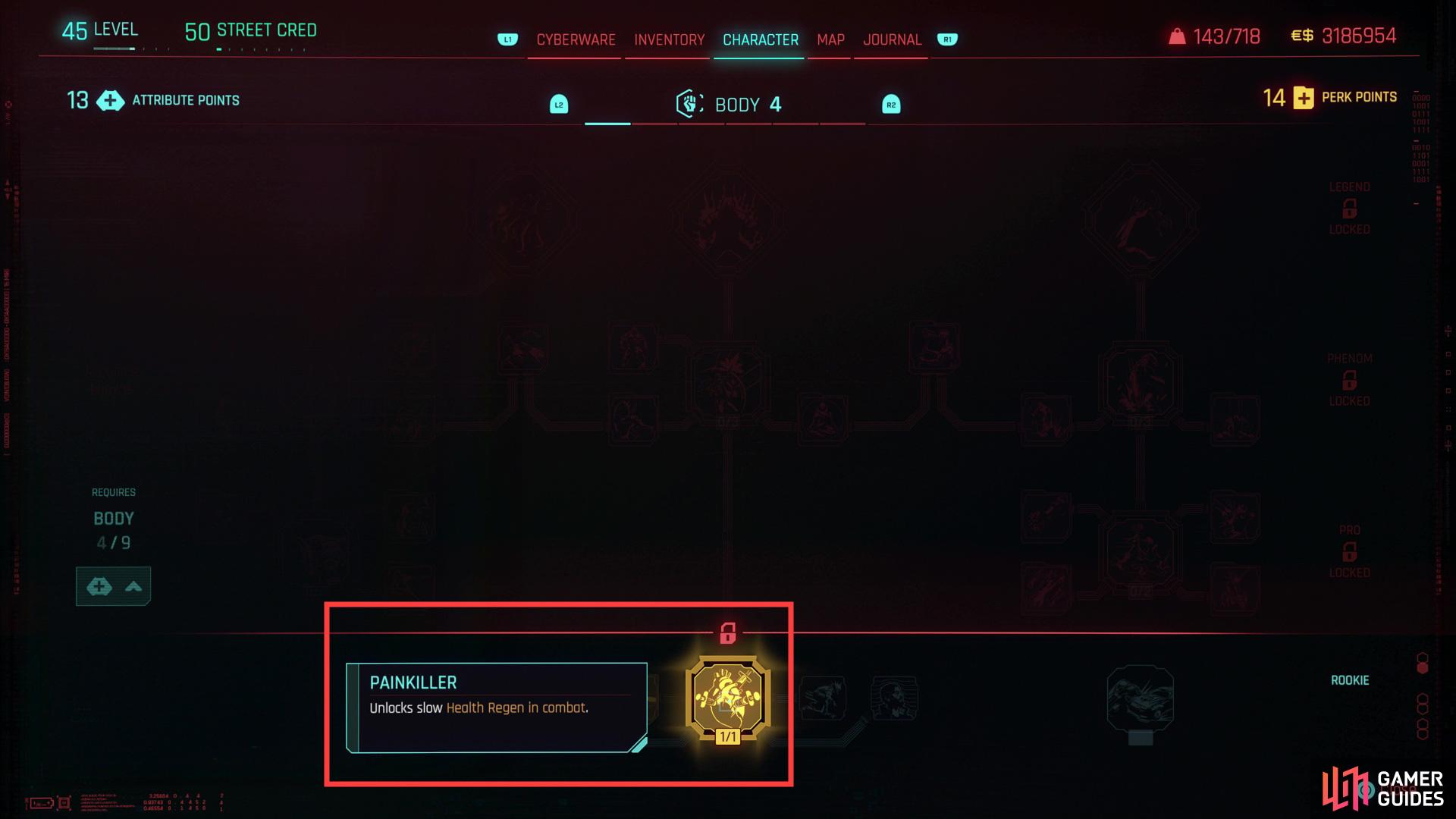
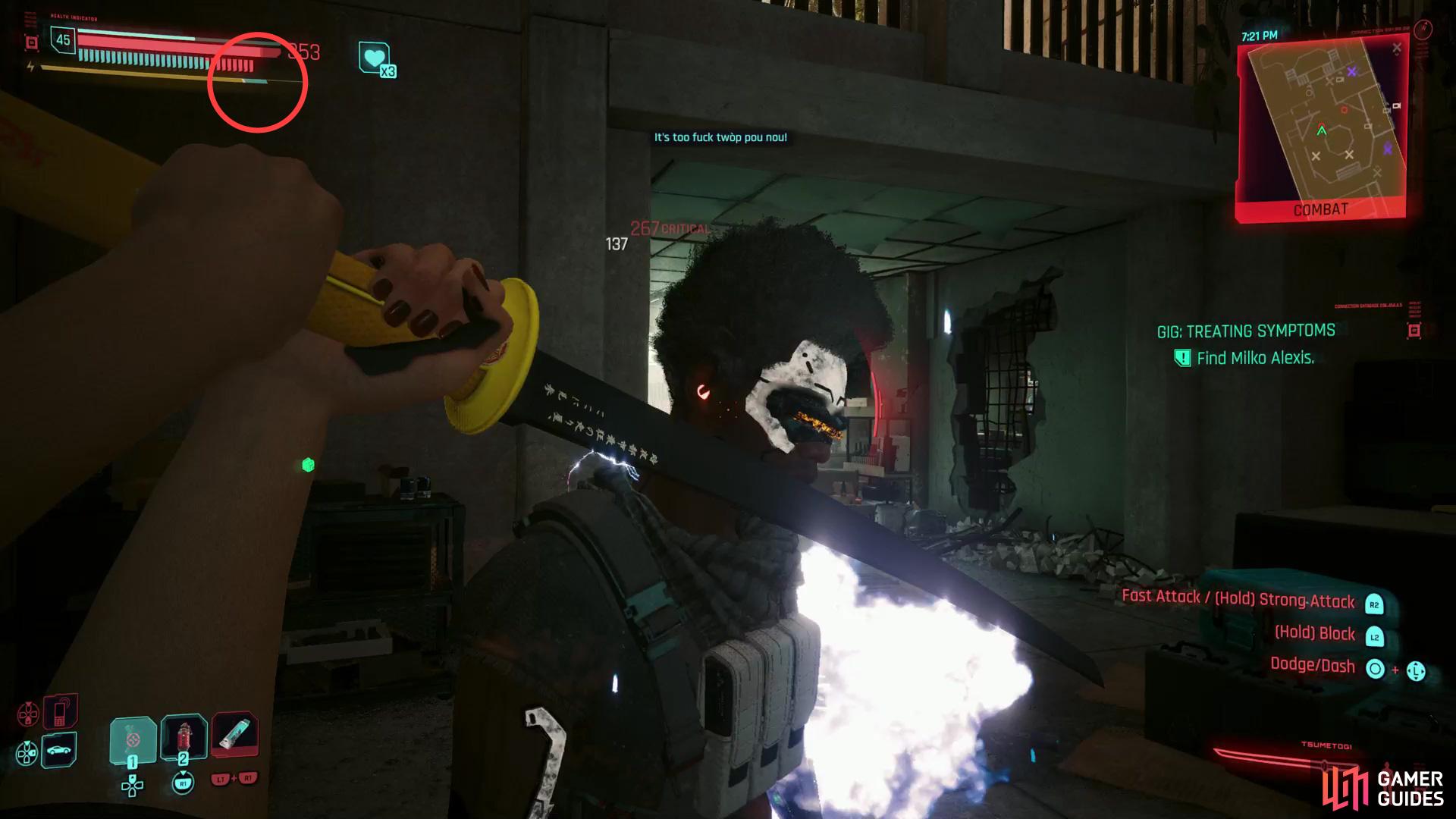






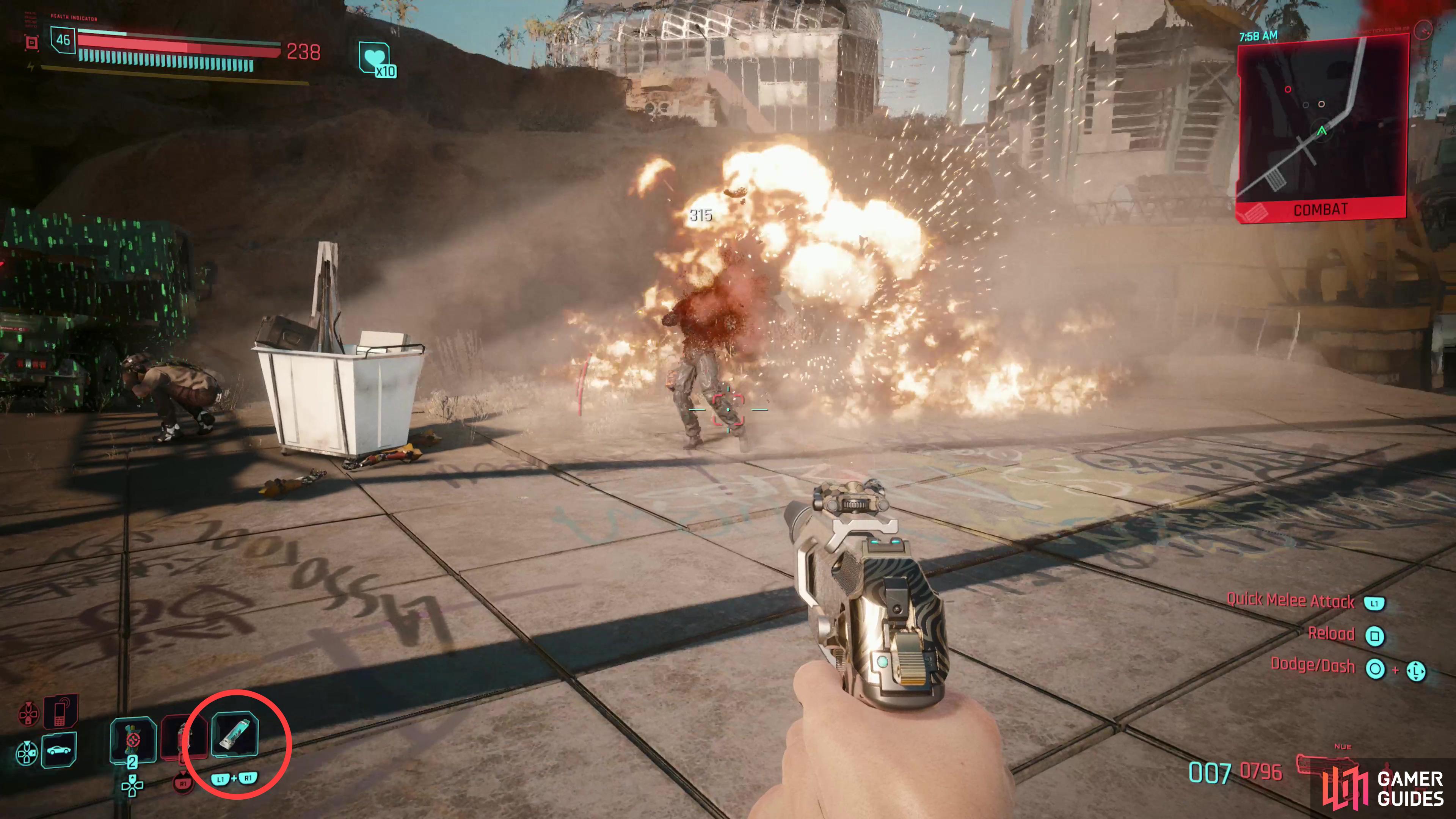
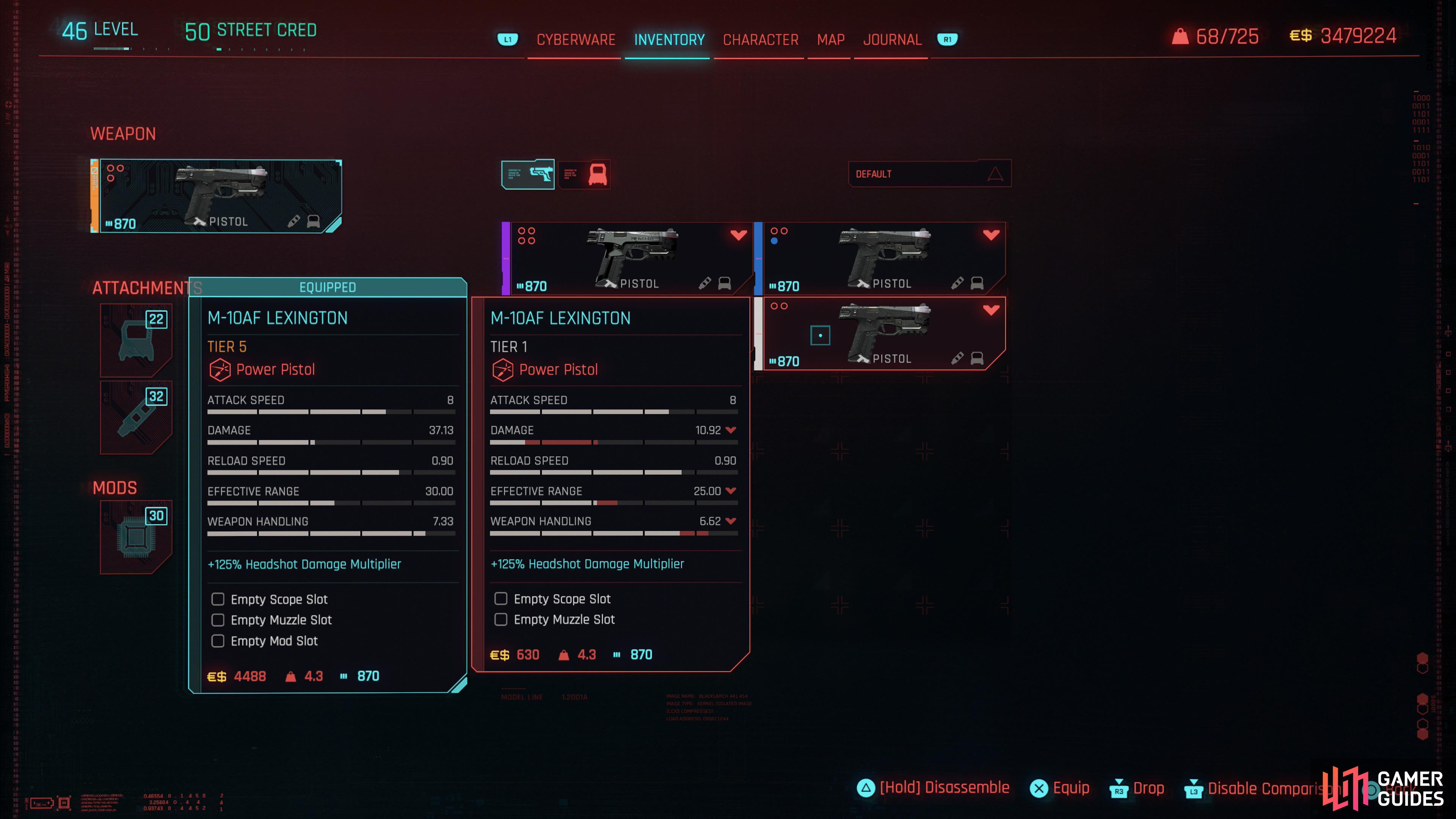


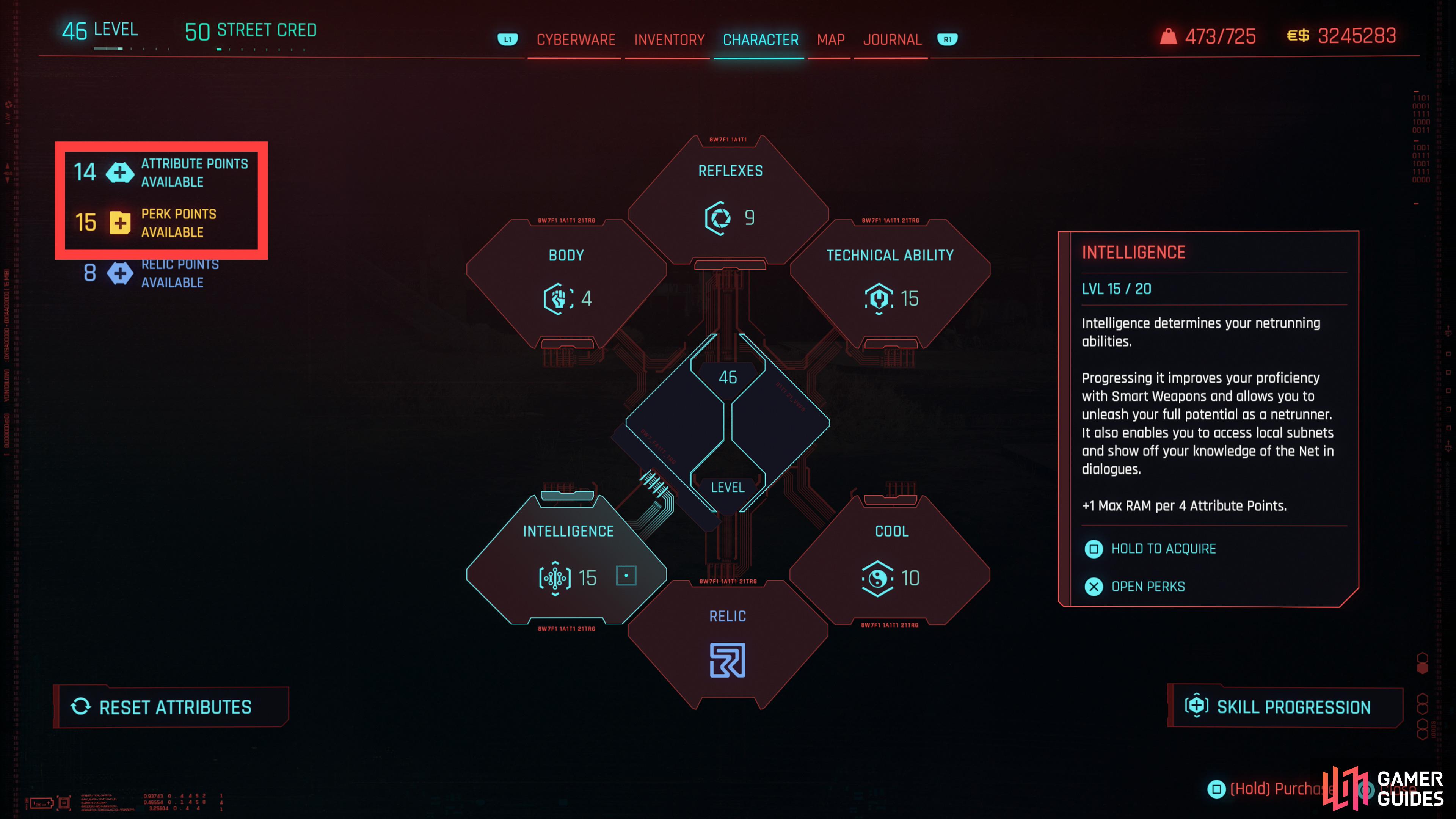
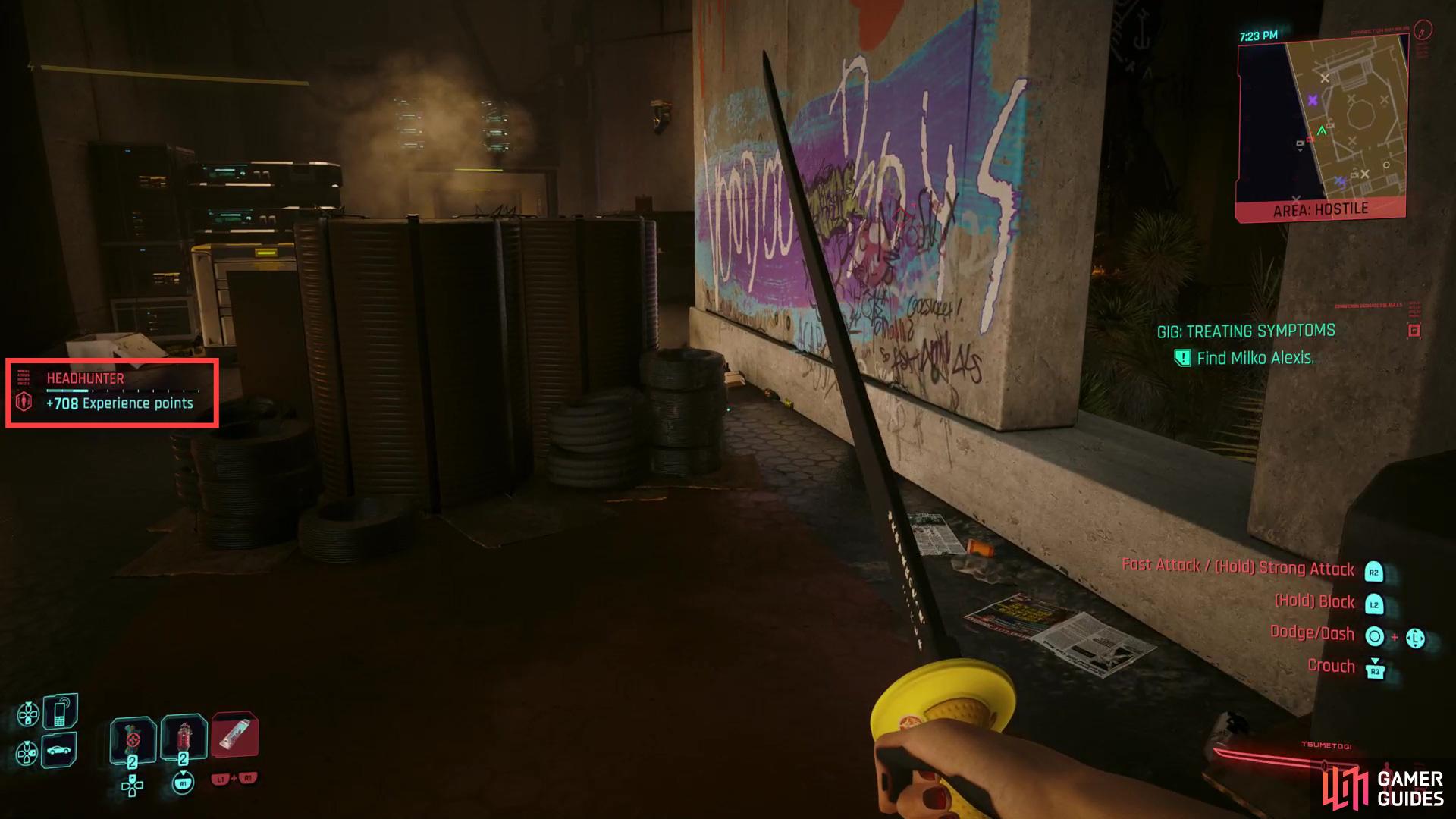


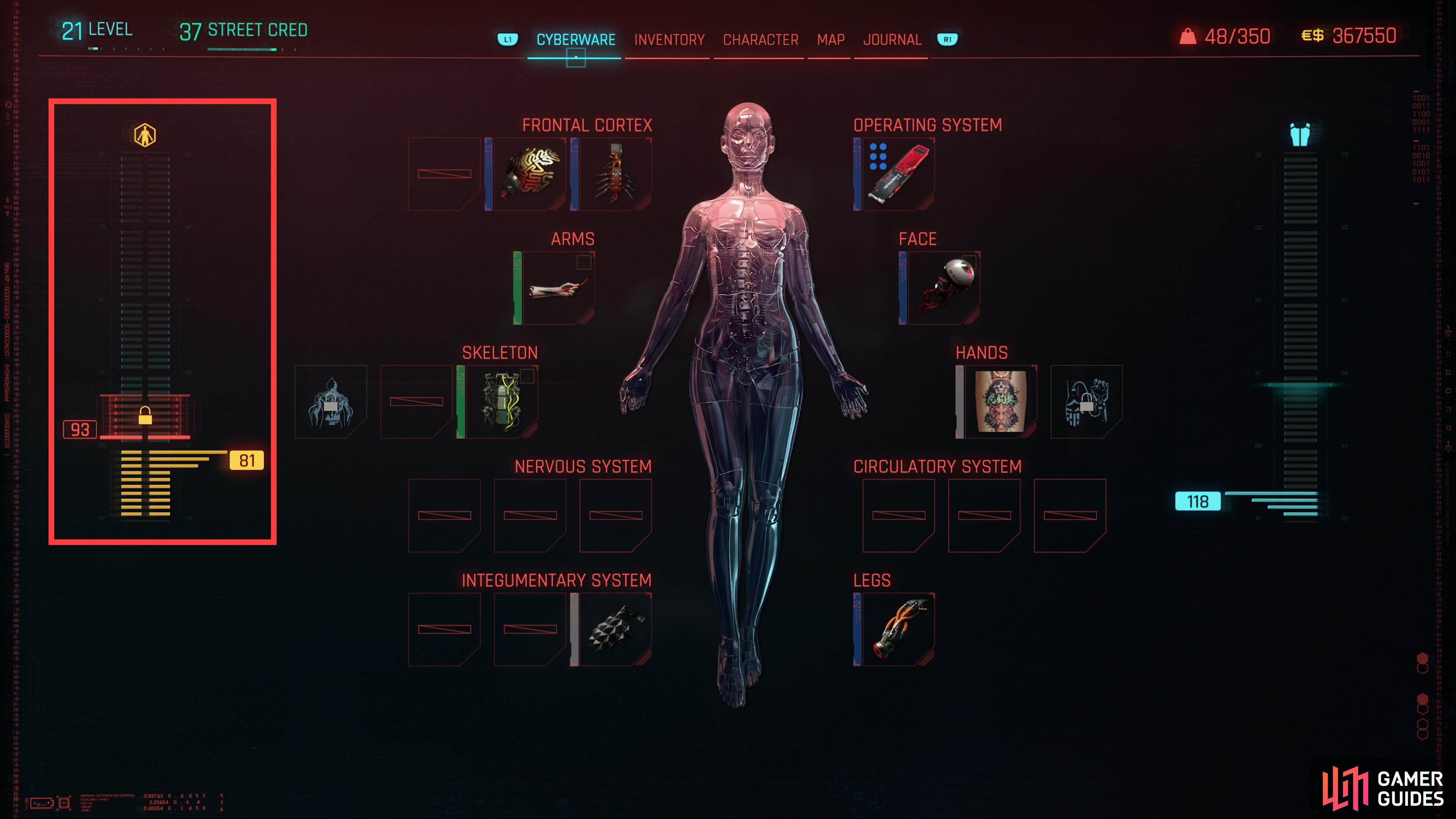

 Sign up
Sign up
No Comments